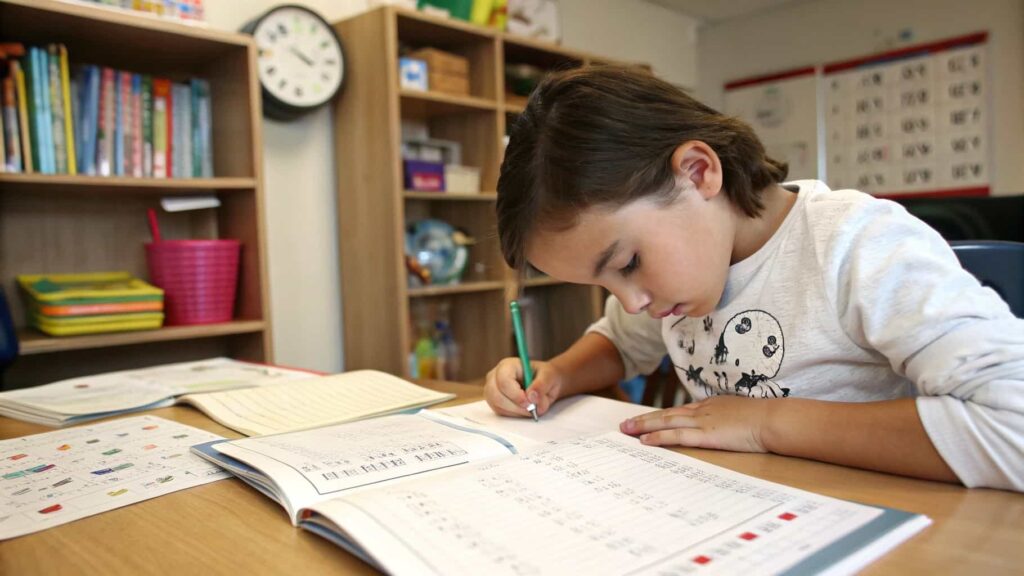The Kumon method, a popular self-learning program designed to help students enhance their skills in subjects like math and reading, has gained worldwide recognition. While many parents swear by its effectiveness in boosting their child’s academic performance, there have been rising concerns about the potential negative effects it may have on mental health.
In this article, we’ll explore the different facets of the Kumon program, focusing on its potential impact on a student’s mental health. We’ll take a closer look at both the positive and negative aspects, examine real concerns about stress, anxiety, and depression, and provide insights to help parents decide whether Kumon is a suitable learning method for their children.
What Is The Kumon Method?
Before we explore the impact on mental health, it’s important to first understand the basics of the Kumon program. Founded by Toru Kumon in Japan, the Kumon method is a self-learning educational program designed to help children develop strong skills in mathematics and reading through daily practice. Kumon worksheets start with simple exercises and gradually become more challenging as students master each concept.

The program encourages self-study, discipline, and independent learning, with a focus on completing worksheets consistently. With millions of students worldwide, Kumon has earned praise for its effectiveness in building fundamental skills. However, as its popularity grows, concerns about its potential negative effects, particularly on students’ mental health, are also increasing.
The Growing Concern – Can Kumon Affect Mental Health?
Though Kumon has been effective for many, some parents and students have reported negative experiences. Concerns often focus on how the pressure to perform—along with the repetitive nature of the program—can have an adverse effect on a student’s mental health. Let’s take a look at some of the potential mental health risks associated with the Kumon method.
Stress and Anxiety:
Kumon’s structured program can place considerable pressure on students to perform well, often resulting in stress and anxiety. The need to complete worksheets quickly and accurately, even when the concepts aren’t fully understood, can be overwhelming. For students who struggle with specific topics, this pressure may make learning feel like an obligation rather than a beneficial process. Over time, this stress may extend beyond academics, affecting other aspects of a child’s life and well-being.
Feelings of Frustration and Low Self-Esteem
As the difficulty of Kumon’s assignments increases, some students may feel left behind, which can lead to frustration. The constant challenge to keep up with the program’s pace may result in feelings of inadequacy, especially for children who are struggling to grasp certain concepts. This struggle, if left unaddressed, can lower self-esteem and create a sense of failure, making the child feel like they are incapable of succeeding. Without emotional support or an opportunity to express these feelings, this frustration can lead to more serious emotional issues, such as depression.
Repetitive Nature of Kumon:
While repetition is a cornerstone of Kumon’s learning method, it can also have unintended drawbacks. For students who thrive on variety or creative problem-solving, the endless cycle of worksheets can feel monotonous. This repetitive approach may cause students to view learning as a tedious task, diminishing their excitement and interest in education. Over time, this lack of engagement can breed resistance to further academic efforts and lead to a negative view of learning as a whole.
Parental Pressure:
The high expectations many parents place on Kumon can inadvertently add to a child’s emotional stress. Parents may see the program as a surefire way to guarantee academic success, but this pressure to meet or exceed expectations can feel overwhelming for children. If the child is unable to keep up with the program’s pace, the emotional strain of trying to meet these demands can cause anxiety and even burnout. This heightened pressure not only affects the child’s mental health but may also harm the parent-child relationship if the child feels they are not meeting parental expectations.
Read: How Do Foot Doctors Make Orthotics?
The Positive Side Of Kumon – Building Confidence And Discipline!
Despite the concerns, Kumon also has many positive effects on mental health. For some students, the program can help build confidence, improve focus, and teach valuable study habits. Let’s explore how Kumon can positively impact a child’s mental well-being.
- Increased Self-Confidence: As students complete tasks and advance through levels, they gain a sense of achievement, which boosts their self-esteem.
- Improved Focus: The consistent practice and routine of Kumon help children develop better concentration and focus, making them more attentive in other areas of life.
- Encourages Independence: Kumon fosters a sense of autonomy as students work on assignments independently, strengthening their problem-solving and self-learning skills.
- Better Time Management: With regular practice and the discipline of daily tasks, students learn how to manage their time effectively, which benefits them in both academic and personal life.
- Stronger Work Ethic: The program instills the value of persistence and consistency, teaching students that small, incremental efforts lead to greater success.
- Building Academic Resilience: By mastering challenging concepts through repetition, students develop resilience and become more capable of overcoming academic difficulties.
When Is Kumon Not the Right Fit?
While Kumon can be beneficial for many students, it is not the right choice for everyone. It’s essential for parents to be mindful of their child’s emotional and mental health when deciding whether Kumon is appropriate for them. Below are some signs that Kumon may not be the best fit.
| Signs Kumon May Not Be a Good Fit | Possible Implications |
|---|---|
| Consistent frustration with the material | The child may not be ready for the level of difficulty or may need a different learning approach. |
| Loss of interest in learning | Repetitive tasks without creativity may cause the child to become disengaged. |
| Increased stress and anxiety | If a child is constantly stressed about completing tasks, it could lead to emotional distress. |
| Feelings of failure or inadequacy | Struggling with the material and not receiving the emotional support needed may lead to low self-esteem. |
Read: Why Bioidentical Hormones Are Gaining Popularity in Women’s Health
Is Kumon Mentally Draining? – What Real Users Are Saying!
While Kumon is often praised for building strong academic foundations, many learners and parents report that it can take a significant toll on a child’s mental well-being. Across platforms like Reddit, Quora, and Yahoo News, numerous users have shared experiences of burnout, frustration, and emotional distress caused by the repetitive and rigid structure of the Kumon system.
On Reddit, some former students express that Kumon’s drill-based learning made them dread study time. One Redditor mentioned, “It wasn’t just homework—it felt like mental torture. I cried almost every day.” Similarly, on Quora, parents raise concerns about children losing interest in learning altogether, feeling that Kumon prioritized speed and repetition over understanding and engagement.
Yahoo’s coverage adds to this narrative by highlighting how a wave of young adults now jokingly refer to their “Kumon PTSD,” describing how it shaped their academic outlook in both helpful and harmful ways. Though humorous on the surface, these reflections point to deeper concerns about how intense educational programs can affect young minds.
Clearly, while Kumon delivers results for some, it’s not universally beneficial. Emotional strain, lack of creativity, and burnout are common complaints, especially if the program is pushed too rigidly without flexibility or emotional support.
How To Mitigate The Negative Effects Of Kumon?
If your child is struggling with Kumon, there are steps you can take to alleviate some of the negative impacts on their mental health. Here are a few suggestions:

Maintain Open Communication with Your Child:
Encourage your child to express their feelings about Kumon and any struggles they may be experiencing. Regularly check in to see if they’re feeling overwhelmed, anxious, or frustrated. This ensures that their emotional well-being is considered and addressed before it becomes a serious concern.
Create a Balanced Routine:
Ensure that Kumon work doesn’t dominate your child’s schedule. Include time for play, relaxation, and other extracurricular activities that help relieve stress. A well-rounded routine can help maintain mental balance and prevent burnout from excessive academic pressure.
Set Realistic Expectations:
Avoid placing unrealistic demands on your child to perform perfectly or keep up with the pace of the program. Understand that Kumon’s goal is to foster learning at the child’s individual pace, and not to create unnecessary pressure. Setting achievable milestones can help prevent feelings of inadequacy or failure.
Provide Positive Reinforcement:
Celebrate small successes and milestones to boost your child’s confidence. Praise their effort rather than just the results, which helps them focus on the process of learning rather than solely on performance. Positive reinforcement builds resilience and encourages a healthy attitude towards learning.
Monitor Progress and Adjust When Needed:
Keep track of how your child is progressing with Kumon and reassess if the program is causing stress. If they show signs of frustration or a lack of motivation, consider adjusting their workload or taking breaks to give them time to recharge. Flexibility in the approach ensures that learning remains a positive experience.
FAQs:
Can Kumon lead to stress and anxiety?
Yes, Kumon can create stress and anxiety, especially when students are pressured to complete tasks quickly or fail to fully understand the material. The constant focus on accuracy and speed may lead to feelings of frustration. It’s important for parents to monitor their child’s emotional state during the program.
How does Kumon affect a child’s self-esteem?
If a child struggles to keep up with Kumon’s pace or finds the material challenging, it may negatively impact their self-esteem. The inability to understand difficult concepts may lead to feelings of inadequacy. Building a supportive environment at home can help boost their confidence.
Is Kumon too repetitive for children?
Some students may find Kumon’s repetitive nature tedious and disengaging. While repetition helps reinforce skills, it may lead to boredom for those who thrive on variety. To combat this, parents can encourage a healthy balance with other more interactive learning methods.
Does Kumon foster a love of learning?
For some children, Kumon can become a barrier to developing a love of learning due to its focus on repetition and speed. To counter this, parents can introduce creative and stimulating learning activities alongside Kumon. This helps balance structured practice with opportunities for exploration.
Can Kumon cause feelings of frustration?
Yes, Kumon can cause frustration when students struggle to keep up with increasingly difficult material. If the child doesn’t fully understand the concepts or feels overwhelmed, this frustration can lead to a negative mindset. Open discussions about progress and difficulty can help alleviate these feelings.
How does Kumon compare to traditional schooling?
Kumon differs from traditional schooling by focusing on individualized learning through worksheets. While traditional schooling often offers group learning and interactive methods, Kumon emphasizes self-paced study. This can be helpful for some but less engaging for others, especially if the child prefers social or creative learning.
What should I do if my child feels overwhelmed by Kumon?
If your child feels overwhelmed, it’s important to address the issue immediately. Talk to your child about their feelings and consider adjusting the workload or providing additional support. Taking a short break from Kumon may also help alleviate stress and re-energize the child.
Conclusion:
Kumon’s impact on mental health is not one-size-fits-all. For some children, the program’s structured approach provides a boost in confidence, independence, and academic skills. For others, however, the pressure to perform and the repetitiveness of the tasks can lead to stress, anxiety, and even depression.
As a parent, it’s essential to monitor your child’s emotional well-being while they are enrolled in Kumon. If the program is causing more harm than good, it may be time to reassess whether Kumon is the right fit. Ultimately, the decision should prioritize your child’s mental health and happiness, ensuring that education remains a positive experience.
Also Read:


Leave a Reply